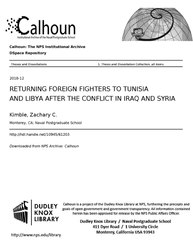File:RETURNING FOREIGN FIGHTERS TO TUNISIA AND LIBYA AFTER THE CONFLICT IN IRAQ AND SYRIA (IA returningforeign1094561203).pdf

Original file (1,275 × 1,650 pixels, file size: 1.94 MB, MIME type: application/pdf, 92 pages)
Captions
Captions
Summary[edit]
| RETURNING FOREIGN FIGHTERS TO TUNISIA AND LIBYA AFTER THE CONFLICT IN IRAQ AND SYRIA
( |
||
|---|---|---|
| Author |
Kimble, Zachary C. |
|
| Title |
RETURNING FOREIGN FIGHTERS TO TUNISIA AND LIBYA AFTER THE CONFLICT IN IRAQ AND SYRIA |
|
| Publisher |
Monterey, CA; Naval Postgraduate School |
|
| Description |
Many of the fighters who traveled from their home states in Africa and Europe have begun to return as the Islamic State (IS) has lost control over much of the territory it seized in Iraq and Syria. These returnees are not only fighters; they are also family members or individuals who supported the organization indirectly. As estimated by Richard Barrett in Beyond the Caliphate, a minimum of 5,600 individuals have returned home to 33 countries around the world as of October 2017. Some of them have chosen to return to under-governed states rather than their nation of origin to connect with and gain support from Salafi-Jihadist networks or to escape punishment in their home states that have implemented strict policies of judicial punishment for IS and its supporters. Returnees are perceived as a significant threat both due to their battlefield experience and their ability to strengthen existing networks and to increase convergence of disconnected or loosely connected networks in the region. This thesis examines governments, political parties, and extremist organizations via case study and network analysis to highlight which groups are most likely to receive returning fighters and to determine if their policies are likely to strengthen or weaken their ties to extremism upon their return. Subjects: Syria; Iraq; ISIS; IS; Libya; Tunisia; foreign fighter; Ennahda |
|
| Language | English | |
| Publication date | December 2018 | |
| Current location |
IA Collections: navalpostgraduateschoollibrary; fedlink |
|
| Accession number |
returningforeign1094561203 |
|
| Source | ||
| Permission (Reusing this file) |
This publication is a work of the U.S. Government as defined in Title 17, United States Code, Section 101. Copyright protection is not available for this work in the United States. | |
Licensing[edit]
| Public domainPublic domainfalsefalse |
This work is in the public domain in the United States because it is a work prepared by an officer or employee of the United States Government as part of that person’s official duties under the terms of Title 17, Chapter 1, Section 105 of the US Code.
Note: This only applies to original works of the Federal Government and not to the work of any individual U.S. state, territory, commonwealth, county, municipality, or any other subdivision. This template also does not apply to postage stamp designs published by the United States Postal Service since 1978. (See § 313.6(C)(1) of Compendium of U.S. Copyright Office Practices). It also does not apply to certain US coins; see The US Mint Terms of Use.
|
 | |
| This file has been identified as being free of known restrictions under copyright law, including all related and neighboring rights. | ||
https://creativecommons.org/publicdomain/mark/1.0/PDMCreative Commons Public Domain Mark 1.0falsefalse
File history
Click on a date/time to view the file as it appeared at that time.
| Date/Time | Thumbnail | Dimensions | User | Comment | |
|---|---|---|---|---|---|
| current | 09:57, 24 July 2020 |  | 1,275 × 1,650, 92 pages (1.94 MB) | Fæ (talk | contribs) | FEDLINK - United States Federal Collection returningforeign1094561203 (User talk:Fæ/IA books#Fork8) (batch 1993-2020 #26711) |
You cannot overwrite this file.
File usage on Commons
The following page uses this file:
Metadata
This file contains additional information such as Exif metadata which may have been added by the digital camera, scanner, or software program used to create or digitize it. If the file has been modified from its original state, some details such as the timestamp may not fully reflect those of the original file. The timestamp is only as accurate as the clock in the camera, and it may be completely wrong.
| Short title | RETURNING FOREIGN FIGHTERS TO TUNISIA AND LIBYA AFTER THE CONFLICT IN IRAQ AND SYRIA |
|---|---|
| Image title | |
| Author | Kimble, Zachary C. |
| Software used | Kimble, Zachary C. |
| Conversion program | Adobe PDF Library 11.0 |
| Encrypted | no |
| Page size | 612 x 792 pts (letter) |
| Version of PDF format | 1.4 |

